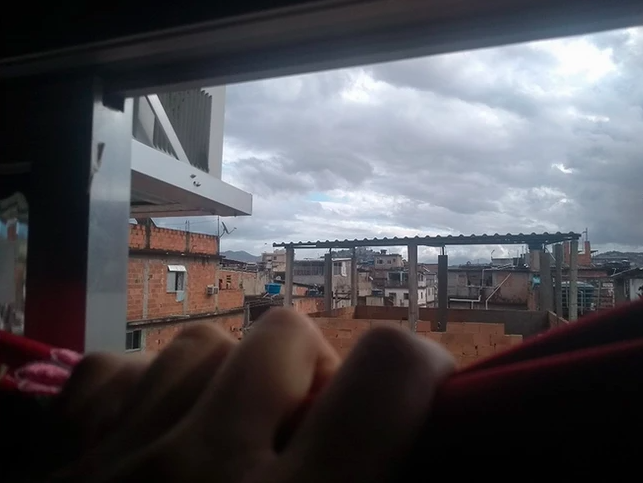Twice a week a group of six young artists from Maré, the largest favela complex in Rio de Janeiro log into Zoom to write poetry together online. Six young photographers have been documenting what they see from their windows during the lockdown. A local choir, made up of 20 voices with experience of substance abuse, has been silenced by the pandemic but they too will soon begin to photograph and write about how their experiences in this unprecedented health and economic crisis.
In light of the pandemic, People’s Palace Projects had to adapt its 30 month research project Building the Barricades, which began in September 2018. The multi-disciplinary project aims to understand the impact of armed conflict and social-economical exclusion on the mental health and wellbeing of 140,000 people living in the Complex of Maré and how the arts can build resilience and response to this reality.
Coronavirus has exacerbated inequalities: more people are now jobless and relying on donations to survive. PPP has launched a fundraising campaign to help partner NGO Redes da Maré to distribute food, water and hygiene items to those in need in the favela.
Donate here:
justgiving.com/campaign/redesdamareagainstcovid19
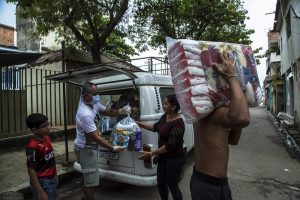
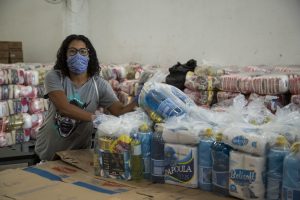
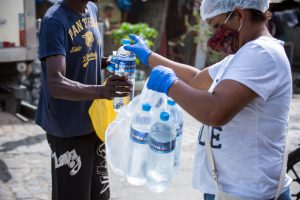
The coronavirus has not brought police interventions to a halt in Rio. Officers still engage in regular favela incursions, sometimes making international headlines when innocent children are, once again, among the victims of this endless series of raids.
This “normalised” violence combined with the isolation forced by Covid-19 is being used as a source of inspiration for many young artists of Maré. Although confined to their homes, they are encouraged to express themselves through poetry, photography and music. Art becomes a positive response, and an escape.
- Writers workshops
Since mid-March 2020, six young artists – MC Martina, Rodrigo Souza, Jonathan, Panta , Thais Ayomide and Thaina Farias – have been gathering online to write poetry and manifestos, commissioned as part of the arts strand of the research.
They take part in workshops led by Professor Paul Heritage, director of People’s Palace Projects, and Welsh theatre director Catherine Paskell. Collaboratively they’ve been producing texts, poems, short stories and narratives about their daily lives and wellbeing in the time of Covid-19. So far the collaboration has produced four conceptual videos that you can watch here:
The group is now planning to release the first of four monthly podcasts. The format is being shaped with a podcast producer and aims to cover topics such as gender, race, police brutality and social inequalities. The idea is to showcase the writing material they’ve been working on: poems, mantras and novels.
In addition to the podcasts, creative director Rafael Rocha is set to produce a musical album based on the performances, poems and writings the six artists produce, to be released digitally in late September 2020. Rafael Rocha is known for his work with internationally acclaimed Brazilian artists such as Adriana Calcanhotto and Gilberto Gil.
This was originally conceived as a performance at a renowned venue in Rio de Janeiro, involving around two thousand Maré residents, but this had to be cancelled due to the pandemic. The team have found other mediums and means of reaching large audience with their creative work.
- A Maré de Casa
In April 2020, six young photographers from Maré -Christine Jones, Fagner França, Jailton Nunes, Juliana Oliveira, Jonas Willame and Larisse Paiva – started to capture and document their lives in lockdown through photography and written diaries. The project is led by renowned visual artist Tatiana Altberg and researcher Raquel Tamaio.
Now the idea is expanding. All residents of the favela complex are invited to collaborate and photograph what they see from their windows. The result is displayed on this newly-created website www.amaredecasa.org.br
Once a month, the public is encouraged to choose the five best photos and diaries. The winners will receive a small prize and have their works highlighted on the website.
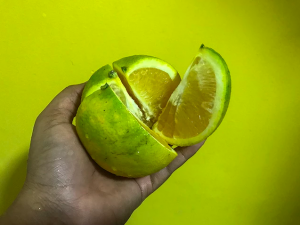
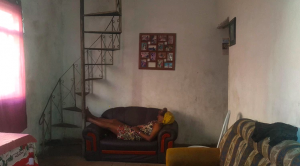
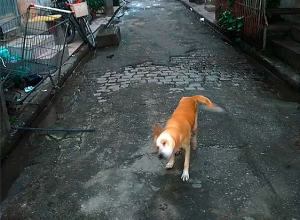
- Choirs
As gatherings are not allowed, the choir’s regular rehearsals have been suspended. PPP is planning to give them disposable cameras and notepads so they can photograph and write about their experience during the pandemic.
Most of the choir members are people with experience of homelessness assisted by Redes da Mare at Espaço Normal, a centre for substance abuse and mental health. With the space now temporarily closed members are getting a daily warm meal and psychological and legal help on the streets of Maré.
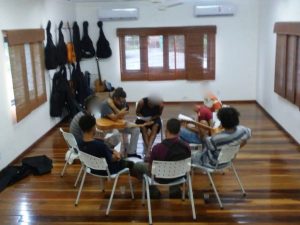
- Book and Arts Catalogue:
The Building the Barricades project managed to conclude its quantitative research survey before the pandemic hit Rio de Janeiro. A total of 1,400 interviews were conducted with residents of Maré, including 200 people with experience of substance abuse.
The second part of the research, based on qualitative interviews, had to be adapted to three sub-studies – health, social sciences and culture – which will now focus on the impact of the pandemic on the wellbeing of residents of Maré.
Anthropologist, author and former Brazilian Minister of Justice Luiz Eduardo Soares is part of the research team, collecting testimonies and interviews about how the pandemic has affected the community and the residents wellbeing. The result will be published in a narrative book by 2021.
- Dance, music, video, podcasts, theatre and children’s bookclub
People’s Palace Projects will sponsor five artists from Mare during the lockdown.
This is part of a Redes da Maré initiative to encourage residents – DJs, poets, digital influencers, dancers, designers, singers and arts producers – to apply for cultural projects.
The proposals have to explore themes like health, isolation and creative ways of delivering messages of prevention. They must all be developed from home or to comply with social distancing in the favelas. The selected 33 candidates will receive mentoring sessions and prizes of up to £1,400 in value.
*Feature image by Jonas Willame
Building the Barricades is funded by the Arts and Humanities Research Council/Economic and Social Research Council (Global Challenges Research Fund) and is a collaboration between Queen Mary University of London (People’s Palace Projects and the Unit for Social and Community Psychiatry), Federal University of Rio de Janeiro and Redes de Desenvolvimento da Maré (Maré Development Networks).
